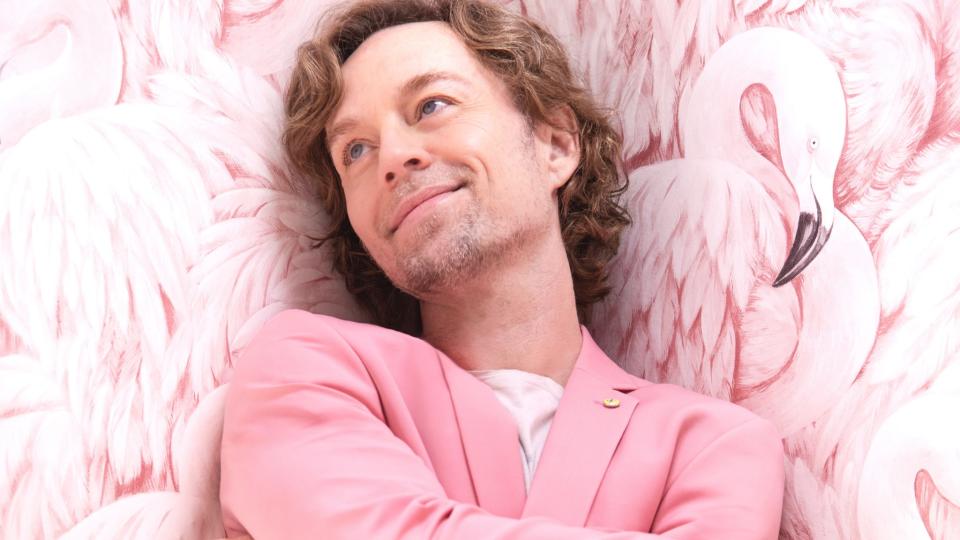When Brisbane’s Savage Garden broke out with the worldwide hits “I Want You,” “Truly, Madly, Deeply,” and “I Knew I Loved You” 25 years ago, they became one of Australia’s all-time most successful bands. The latter two singles established them as record-holders for the longest number of weeks on the Billboard Adult Contemporary chart (a combined 247weeks), and their self-titled debut album went seven times platinum in the U.S. alone. But this sudden push into the spotlight was difficult for frontman Darren Hayes, who suffered from depression (which runs in his family) and low self-esteem, and was struggling to come to terms with his sexuality.
Hayes came out to his wife shortly thereafter, a “really sad process” that inspired much of Savage Garden’s second (and, as it turned out), final album, Affirmation. He later embarked a solo career, but he was unable to repeat Savage Garden’s success in America, because, as he tells Yahoo Entertainment/SiriusXM Volume during a Pride Month interview, his “homophobic” record label at the time thought he seemed “too obviously gay” for the U.S. market. “I don’t blame [Americans] for thinking that I might have just retired or dropped dead,” he jokes.
The pop singer, now age 50, actually took a decade-long hiatus from recording to try his hand at stand-up comedy in Los Angeles, where he now happily resides with his husband of 17 years. But now he is back, making music on his own label and on his own terms, with nothing more to hide. And his new single “Poison Blood,” about his history of depression and suicide, is his rawest and most personal song yet. In the conversation below, Hayes opens up about his long journey to self-acceptance, including a tough conversation with his then-wife that ultimately forced him to live his truth.
Yahoo Entertainment: I know a lot of people, at least people in America, know you from Savage Garden. And I’m sure we’ll get into some Savage Garden talk, but I want to first congratulate you on your powerful new single, “Poison Blood.”
Darren Hayes: Well, thanks for just even talking to me, because I joke about this in the U.S.: I don’t blame people for thinking that I might have just retired or dropped dead.
Ha! I don’t think I ever thought you dropped dead, but I did think maybe you retired. After all, you didn’t make music for almost about 10 years.
Yeah. So, Savage Garden happened, and then I was a solo artist and made four albums, and then in 2012, I just disappeared. I went to the Groundlings Theater. … I trained there for like three years and almost made it to Sunday company, but didn’t quite make it through. I did some terrible stand-up, which was amazing. It was so good for the ego to flop — you know, to play in a room of three or four people, half of which are comedians, just waiting for their turn to get up onstage. [laughs]
Now that you are back to making music, would you say “Poison Blood” is your most personal song yet? It’s about some pretty heavy stuff that you’ve gone through.
Yeah, it is. I guess I didn’t realize just how personal it was, really, until I released it. And the reaction from some of the most hardcore fans has been so beautiful, but just so overwhelming, because I don’t think people realize just how much my depression has affected me over the years. I come from a family history of manic depression and suicidal tendencies. I’m really lucky that I’ve had a lot of therapy, and I take a cocktail of medication that keeps me here every day. And in that song, I say [my mental illness] is a blessing, a gift, and a curse, because — as with most artists who have any kind of mental health challenges — it allows me to see such a vivid spectrum of color and feel this vivid spectrum of emotions. But sometimes they can also be really overwhelming. And I say in the song, every day is a decision to stay. It’s brought on these incredible conversations in my DMs with a lot of fans, people that just say, “Thank you for putting into words how I feel.” And I’ve been making this pact with a lot of fans, just saying, “Let’s choose to stay.” That is a really powerful pact you can make with someone, that no matter what the feeling in the moment, I have learned that it always passes. I’ll be light and funny about this for a second, but sometimes on my darkest days I can wake up the next day and think, “Oh man, I’m so glad I’m here, because I got to watch that new episode of Obi-Wan Kenobi,” you know what I mean? There are little reasons to live every day.
When you are caught up in the storm, I always think of it as like you’re in an airplane and all the instruments are telling you that the plane is crashing — but it’s just because your instruments and your mind are off. Your brain chemistry is lying to you. The plane’s just doing fine. And the next day you can wake up and realize, “Oh yeah, I was just reading the instruments wrong.” It doesn’t mean that your perspective is incorrect, because to me and to anyone that is going through this stuff, it feels absolutely real. But with some time and distance and talking to the people that you love, you realize, “Oh, my perspective was just shifted.” And that’s that to me is such a gift, to have the distance of time away from your feelings to get straight.
[embedded content]
Is there any significance to the timing of releasing “Poison Blood” during Pride Month?
Very, very much so. … I’m very aware that the rates of depression and suicide amongst our community is just so, so high, and a lot of that is about shame, still to this day. As far as we have come with these incredible pioneers in the entertainment industry like Cub Sport, Troye Sivan, Lil Nas X — and I didn’t have a lot of those sort of people to look up to when I was younger — it’s not all rainbows and glitter and unicorns. You only have to look at some of my YouTube comments, or the comments of Lil Nas X, or any out performer, to know that there’s still a lot of ignorance around. And that can take a mental toll. So, I kind of wanted my song to be a reminder that I’m still here. I’m 50, and I’m not just living with the mental illness — I think I’m thriving.
When you first exploded onto the scene in the ‘90s with Savage Garden, mental health wasn’t something people talked about very openly.
Yeah, I think my first kind of mental break happened when I was maybe around 18 or 19, and I didn’t realize it. And by the time I was, very fortunately, thrust into the public eye… I’ll never complain about that, as it was an extraordinary gift and opportunity, but I think the pressures of having all of that attention really took its toll on me. And I thought that it meant that I was ungrateful if I complained about it. So, I just didn’t complain and kind of sucked it up.
Well, as you mentioned, online comments nowadays can be pretty vicious. I guess that was one advantage you had in 1997 — the internet was new, and social media didn’t exist.
We had this other thing, which was chat rooms and this incredible chosen family of online community that you could seek out. And when I looked out into the audience, whether that was digitally or onstage, when I was going through my own struggle with my sexuality or my self-worth or my identity, I was dealing with a lot of the things that young women were dealing with. So, there was that kind of sacred bond. I think there’s a thing that happens with pop stars and teen girls, and people can mock it, but I think it’s so sacred. The teen girls are on the precipice of adulthood and looking for this thing that’s kind of beyond the predatory kind of #MeToo aspect of male/female interaction. They’re looking to express their sexuality or be seen in a way that’s not just as an object. And being a gay pop star, it was beautiful for me, because I could look out and identify with these feelings. Like, I hated what I looked like…
Really? You were a bona fide heartthrob!
No, I felt like I was standing next to the good-looking one! I felt strange and weird. But what I loved was that the audience made me feel seen, you know? And so, these young people that were going through body dysmorphia, or had eating disorders, or just the general stuff that teens go through, which is just like “my body’s changing” or “I’m having these big emotions and I don’t know how to process them” — I was going through that too. And so, I found a community of people that heard in the subtext of my songs that I was crying out to be loved for who I really was. And I found an audience that also just wanted to be seen for who they were.
[embedded content]
You were still closeted then. I imagine you being in the spotlight while still trying to figure out your sexuality must have really messed with your head.
It was confusing, because there was a lot of love and attention being sent my way. I had a lot of imposter syndrome. I think part of me coming back with music that’s sort of unapologetically gay is a chance for me to sit in this situation and try to receive some of this love and accept it for who I truly am. I think there was a part of me back then that felt if people knew who I truly was, would they be repulsed by me? Would they be disgusted by me? And I was trying to lay little breadcrumbs in my lyrics. Like in the song “Affirmation,” I had the line, “I believe you can’t control or choose your sexuality.” In 1999, I sang that on the Jay Leno show, and I looked down the barrel of the camera and I winked! I was trying to ask the audience, “Would you still love me if I were gay?” I was trying to be outed. I also started to change the gender terms that I used in my songs. I never had a “fake girlfriend,” and what’s strange about me is I never admitted that I was married! It was the press that actually picked up on that, and I was furious because I wanted to have a private life. I always protected that part of me. I like to think that I lived as authentically as I could in the ‘90s… but I had a very homophobic record label…
Really?
Oh, yes. When I became a solo artist, I made a music video for my first single “Insatiable,” and I had my natural-color hair, and I danced in the music video. And the president of the label said, “He looks too obviously gay. We are going to have to pull all promotion for him in the U.S.” So, a lot of the reason you don’t know about me as solo artist in the U.S. is because my first-ever single essentially got buried. All the money that was supposed to be allocated to promoting me as a solo artist was just taken away, because they felt like I looked “too gay.” And I actually got dropped.
[embedded content]
That’s terrible. You mentioned you married at this time?
Yes, in fact, I was married to a woman when Savage Garden came out! That’s how deeply embedded I was into my own self-shame and homophobia. I actually came out before I’d even held anyone’s hand or kissed a boy. It was just this realization. I remember coming home to my wife and just saying, “I think I’m gay.” And it was this unraveling and really sad process, because I loved her deeply. I really, really did love her deeply, but because I had shelved so much of who I was into my deep, deep, subconscious mind. I didn’t want to be gay, and that’s my own internalized homophobia. I really didn’t want to be. But what was happening in my art, in my music, in my fashion, I think now you look back and you can see it from space: “This guy’s gay!” [laughs] Back then, we would both be like, “Why does everyone think he’s gay?” It was really that innocent. My wife was my college sweetheart. In my town, that’s just what you did: You dated for a couple of years, and then you got married.
[embedded content]
How did your wife react to you telling her the truth about your sexuality?
She was incredible. If you listen to a lot of the Affirmation album, which is the second Savage Garden record, it’s about that. She was such an amazing woman, because her first reaction was, “Listen, we all live on a spectrum somewhere. I love you for who you are.” I think at first she thought maybe I was just saying this was just a part of me and I might need to express it. But I’m a super-monogamous person. I could never be in a relationship where it was like, “Let me just go and play with the boys.” So, I don’t think she realized at the time, but over a period of about a year, it was really clear to both of us that our marriage had to end. And it was very sad, but she was the person who really said to me, “You need to go.” And I didn’t want to. I was prepared to stay forever and just be kind of half a person. But she didn’t want that for me.
It was very, very sad. There’s a song on Affirmation called “I Don’t Know You Anymore,” which is about a pact she’d made where she said, “I want you to just live and see if you can be a gay man. And we have to have no contact for a year. It’s the only way that this is going to work.” And it was so hard for me; I wanted to come back all the time. And thank God she wouldn’t let me. She was just so strong, and that amount of strength — to love someone so much that you’re willing to let them go — it just blows me away. We’re still friends to this day, and I’m so grateful to her for loving me enough to let me go.
[embedded content]
That’s a fantastic story, because quite frankly, most partners would not react that way.
Yes, it would be a horrible thing to be married to someone who was really somebody else. But I think in my situation, it was so complicated. I didn’t even know who I was. And we found out at the same time, in some ways. I was just so culturally and spiritually and emotionally wrapped up in shame that it really took a while for me to see the wider world. I didn’t have a role model; back then there weren’t a lot of people in the public eye that I could look at and think, “Oh, that’s me.” There were just these extremes, and a lot of them were very negative stereotypes: people that were being punished, people that were dying of HIV, or people that were mocked. Let’s just say it wasn’t a job application I was dying to fill out.
How did you come out publicly, to your fans?
Well, this will date me, but I came out on Myspace when I married Richard, my husband of now 17 years. I don’t even think I said I was gay. I just said, “I think I should let you all know that yesterday I married my boyfriend of two years in a wedding reception in our backyard in Notting Hill.” And I pressed “publish,” and then I hopped on a plane. I was going Thailand for some shows, and I got on a 12-hour flight. When I landed, I didn’t know what was going to happen, but the world was kind of beautiful about it.
Now you’re on your own record label, making music on your own terms. How are you expressing yourself now, as a 50-year-old out gay man?
Well, I am obsessed with the ‘80s, and I’ve created a world for this era which is really like my lost youth. When I was 20, I didn’t realize I was gay, so I never got to go to a gay club. I never got to hold the guy’s hand. I never got to do any of those things that I’m doing in these music videos. Now I’ve recreated this alternate universe where it’s like, “What if I were adjusted and happy? What if I got to go to a club and have this positive experience as a young gay man?” … It’s this little world that I wish I had lived in, and I’ve kind of gone back and reclaimed it for myself.
The above interview is taken from Darren Hayes’s appearance on the SiriusXM show “Volume West.” Full audio of that conversation is available on the SiriusXM app.
If you or someone you know needs help or someone to talk to, please contact the National Suicide Prevention Lifeline at 800- 273-8255 or the Trevor Project at 866-488-7386.
Read more from Yahoo Entertainment:
Follow Lyndsey on Facebook, Twitter, Instagram, Amazon, Spotify.




